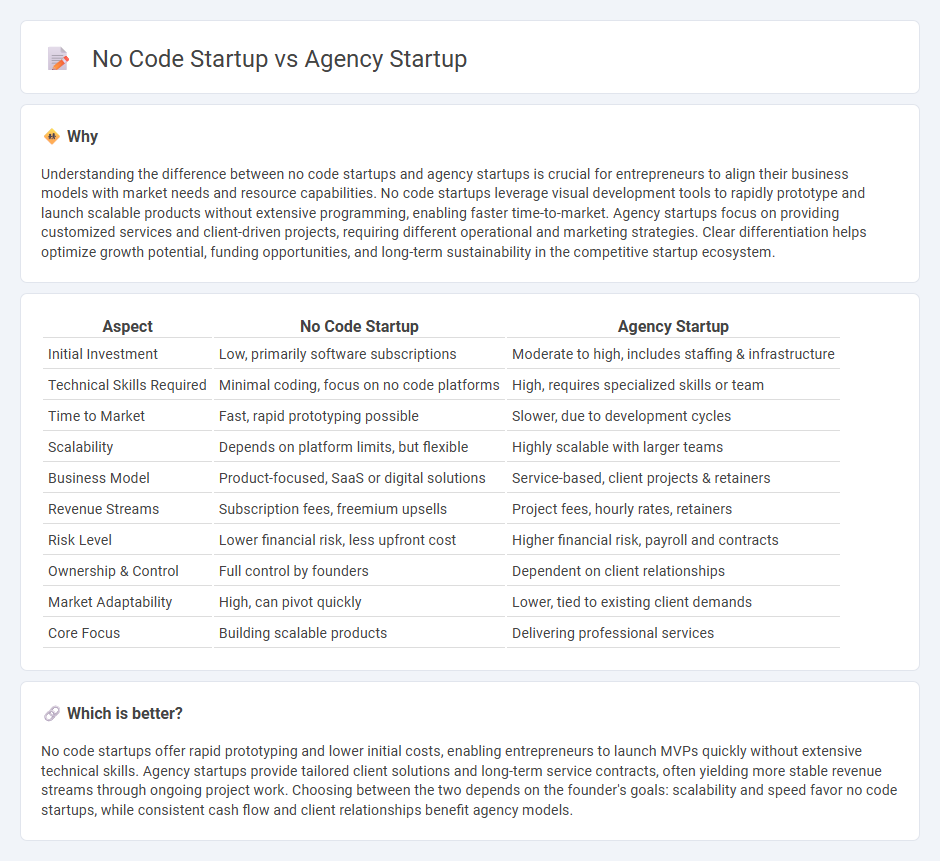
No code startups leverage visual development platforms to rapidly build and launch products without traditional programming, reducing time and cost barriers for entrepreneurs. Agency startups focus on customized client solutions, offering expert services tailored to specific business needs, often requiring specialized skills and longer project timelines. Explore the advantages and challenges of each approach to determine the best fit for your entrepreneurial goals.
Why it is important
Understanding the difference between no code startups and agency startups is crucial for entrepreneurs to align their business models with market needs and resource capabilities. No code startups leverage visual development tools to rapidly prototype and launch scalable products without extensive programming, enabling faster time-to-market. Agency startups focus on providing customized services and client-driven projects, requiring different operational and marketing strategies. Clear differentiation helps optimize growth potential, funding opportunities, and long-term sustainability in the competitive startup ecosystem.
Comparison Table
| Aspect | No Code Startup | Agency Startup |
|---|---|---|
| Initial Investment | Low, primarily software subscriptions | Moderate to high, includes staffing & infrastructure |
| Technical Skills Required | Minimal coding, focus on no code platforms | High, requires specialized skills or team |
| Time to Market | Fast, rapid prototyping possible | Slower, due to development cycles |
| Scalability | Depends on platform limits, but flexible | Highly scalable with larger teams |
| Business Model | Product-focused, SaaS or digital solutions | Service-based, client projects & retainers |
| Revenue Streams | Subscription fees, freemium upsells | Project fees, hourly rates, retainers |
| Risk Level | Lower financial risk, less upfront cost | Higher financial risk, payroll and contracts |
| Ownership & Control | Full control by founders | Dependent on client relationships |
| Market Adaptability | High, can pivot quickly | Lower, tied to existing client demands |
| Core Focus | Building scalable products | Delivering professional services |
Which is better?
No code startups offer rapid prototyping and lower initial costs, enabling entrepreneurs to launch MVPs quickly without extensive technical skills. Agency startups provide tailored client solutions and long-term service contracts, often yielding more stable revenue streams through ongoing project work. Choosing between the two depends on the founder's goals: scalability and speed favor no code startups, while consistent cash flow and client relationships benefit agency models.
Connection
No code startups accelerate entrepreneurship by enabling founders to build and launch products without extensive programming skills, lowering barriers to market entry and reducing development costs. Agency startups often leverage no code tools to quickly prototype, customize, and deliver client solutions, enhancing operational efficiency and scalability. This symbiotic relationship fosters rapid innovation, allowing both types of startups to iterate on ideas and expand their service offerings effectively.
Key Terms
Service-Based Model
Agency startups operate on a service-based business model delivering customized solutions directly to clients, emphasizing tailored project management and client collaboration. In contrast, no code startups focus on creating scalable, automated products using visual development platforms that minimize traditional coding requirements. Explore the unique benefits and challenges of each model to determine the best fit for your entrepreneurial goals.
Automation Tools
Agency startups often build custom automation solutions tailored to specific client needs, leveraging platforms like Zapier, Integromat, or custom API integrations to improve business workflows efficiently. No code startups primarily develop user-friendly automation tools empowering non-technical users to create automated processes without writing code, often enhancing productivity and reducing development time. Explore the distinct advantages and applications of automation tools in both agency and no code startups to discover which model best aligns with your business goals.
Scalability
Agency startups often face scalability challenges due to reliance on human resources and personalized client services, which limits rapid growth. No code startups leverage automation and easy-to-use development platforms, enabling faster scaling with reduced operational costs and less dependency on specialized technical skills. Explore innovative strategies to boost scalability in your startup by understanding these dynamic models.
Source and External Links
How to Start an Agency - This guide outlines nine key steps to starting an agency, emphasizing the importance of choosing a niche based on your expertise, defining services, targeting clients, and setting competitive pricing to build a successful agency business.
How to Start A Marketing Agency In 8 Steps - This resource describes eight essential steps for launching a marketing agency from scratch, such as identifying your ideal target audience, developing detailed customer profiles, and leveraging cost-effective tools to reduce startup costs.
How to Start a Digital Marketing Agency - This article highlights the importance of defining your niche and target market, then covers setting up a legal structure and registering your agency to ensure compliance and a solid foundation for your digital marketing business.
 dowidth.com
dowidth.com